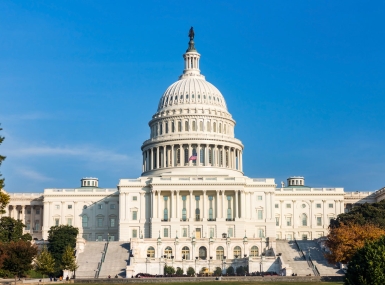U.S. Treasury issues final regulations for Inflation Reduction Act elective pay mechanism
Author

Paige Mellerio
Upcoming Events
Related News

Key Takeaways
On March 5, the U.S. Department of the Treasury (Treasury) and the Internal Revenue Service (IRS) issued final regulations for the elective pay mechanism established in the Inflation Reduction Act (IRA). Using elective pay, also known as direct pay, counties and other tax-exempt entities can monetize certain clean energy tax credits that they have previously been unable to access due to their lack of tax liability.
The final regulations largely mirror the proposed regulations published in June 2023 but provide clarity on how counties can make an elective pay election, including:
- the pre-filing registration process
- adopting a tax year for filing purposes
- combining grants and loans with tax credits
On March 5, Treasury also unveiled a new proposed rule to provide criteria regarding the eligibility of certain ownership structures to claim elective pay.
Pre-Filing Registration
The final regulations confirm that pre-filing registration is mandatory for counties making an elective payment election. They outline the pre-filing registration requirements, including:
- The manner of pre-filing registration
- Pre-filing registration and election for members of a consolidated group
- Timing of pre-filing registration
- That each eligible property must have its own registration number
- Information required to complete the pre-filing registration process
Access the Pre-Filing Registration Tool here. To view the Pre-Filing Registration Tool User Guide and Instructions, click here.
Tax Year Determination
The final regulations provide clarity on how counties can determine their taxable year for the purpose of making an elective pay election. Under the final regulations, counites can adopt a taxable year based on a calendar or fiscal year when filing an initial Form 990-T (the form entities who do not normally file returns will use to make an election).
- For example, a county could choose to file a Form 990-T for 2023 using a calendar tax year, meaning that it could make an elective pay election for an eligible clean energy project regardless of when it was placed in service during the 2023 calendar year.
- Access Form 990-T here.
Grants & Loans
The final regulations confirm that counties can tax-free grants and forgivable loans with elective pay to finance a clean energy project. This means that if a count is funding a project using a grant or loan and successfully makes an elective pay election, it will still receive the full credit amount as a direct payment, as long as the direct payment amount combined with the grant and/or loan does not exceed the total project cost.
Ownership Structures
In addition to the final regulations on elective pay, Treasury and the IRS released a Notice of Proposed Rulemaking (NPRM) on co-ownership arrangements. The proposed rule provides clarification on the treatment of elective pay in instances where a county co-owns an eligible credit property.
- Remember: partnerships as an entity are ineligible to receive elective pay, counties and other eligible entities that co-own a credit property are eligible to receive elective pay for its share of the property if they “elect out” of partnership tax treatment.
The proposed rule adds exceptions to the “elect out” requirement for co-ownership arrangements that were formed to produce electricity from the applicable, co-owned credit property and have one or more applicable entity co-owners that will claim elective pay for their share of the property.
- Public comment on this new proposed rule may be submitted on regulations.gov through May 10, 2024.
What Else Should Counties Know?
Treasury will resume holding office hours for eligible entities. This technical assistance will focus specifically on the pre-filing registration process and filing for elective pay. Office hours will be held on the following dates and times:
- March 13, 1–2:30 p.m. EDT: Register Here
- March 20, 1–2:30 p.m. EDT: Register Here
- March 27, 1–2:30 p.m. EDT: Register Here
- April 3, 1–2:30 p.m. EDT: Register Here
- April 10, 1–2:30 p.m. EDT: Register Here
- April 17, 1–2:30 p.m. EDT: Register Here
- April 24, 1–2:30 p.m. EDT: Register Here
Resource
Inflation Reduction Act Funding Explorer

Related News
‘Fix-It Fair’ brings new life to damaged items, helps divert waste
Thurston County, Wash. partnered with a non-profit, whose members volunteer to fix things that were difficult to recycle.

U.S. House of Representatives passes SPEED Act and other permitting reform bills
On December 18, the U.S. House of Representatives passed the SPEED Act (H.R. 4776). The SPEED Act would strengthen county involvement in decision-making and make needed commonsense reforms to the federal environmental review process.

House Natural Resources Committee advances the Endangered Species Act Amendments Act of 2025
On December 17, the House Natural Resources Committee advanced the Endangered Species Act (ESA) Amendments Act of 2025 (H.R. 1897). The version passed by the committee adopted several changes from the initial bill and would address key county concerns by improving the implementation of the ESA. The legislation now awaits a floor vote before the whole U.S. House of Representatives.
